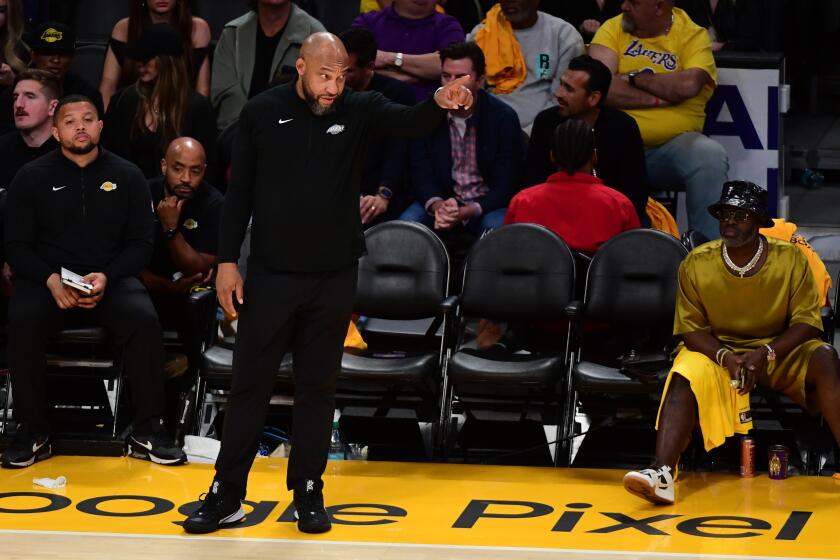Raising the Mercury Level
A month into the rookie season of Phoenix’s Diana Taurasi, the data are insufficient to answer the questions of whether or when she will take the WNBA to a higher level in the American sporting conscience.
But some patterns are emerging.
Among the high-profile rookies in the league this season, Taurasi is off to the best start. Her scoring average of 18.2 points ranks fifth in the league.
She is shooting a respectable 46.7% overall and an impressive 42.4% from beyond the three-point line. She has been the Mercury’s leading scorer in six of its first 10 games. Only once has she been held below 10 points.
Said Phoenix General Manager Seth Sulka, who made Taurasi the first overall pick of the 2004 draft, “She has absolutely delivered on who she was and what she is to be able to do. And probably over-delivered, in my opinion.
“A lot of times you get the high expectations, and the hype of a college player who does well at the collegiate level. Even if they translate in a good way, to deliver on such a high expectation is very difficult. Maybe LeBron James did it this year. He had a tough, tough set of expectations to deliver on and, if you ask just about everyone, he did.
“But rarely is it that quick and immediate an adjustment. And, really, there was no adjustment period for her. But she was ready for the pro game.”
What also seems to be separating Taurasi from her youthful contemporaries is unwavering confidence and the ability to make shots under intense defensive pressure.
“I’ve learned a lot in the last three weeks, how different the game is on and off the court,” Taurasi said.
But she added, “Once you look at it, it’s basketball. Being at UConn for four years prepared me as well as any college program could prepare you to play at this level with the pressures and expectations.”
No, the basketball aspect is covered.
But what about the other things?
High on the list is filling the arenas. Last year in 17 home games, the Mercury’s attendance averaged 8,501. In the first five home games this season, Phoenix averaged 7,197. Sulka, however, is confident that attendance will pick up, now that schools are out and as the Taurasi buzz gets louder.
“There is a true pulse with the Mercury again,” he said. “We have people talking about the Mercury that didn’t talk about us before. Largely, that group is the male adult sports fan who has an appreciation for her basketball skills.
” ... Are we sold out? No, we’re not there yet. But those expectations were we would be up, that she would impact us in an immediate, positive way. And she has.”
What the Mercury has to do now, Sulka said, is build a winning team around their budding star.
Phoenix reached the WNBA Finals in 1998, losing to Houston, but hasn’t reached the playoffs since 2000.
In the last three seasons, the Mercury is 32-66. This season, Phoenix is 5-5.
Even someone as talented as Taurasi won’t change that all by herself. Nor should she carry the whole weight of making sure the league stays afloat.
“There are so many good players in this league, there shouldn’t be one person who just takes the league over,” Taurasi said.
“If there are people who bring more attention to the league, I think that’s good for the game. But the league’s been in existence for only eight years. We still have a lot of growing up to do.”
Sulka stresses patience as well. The benefits the Mercury and the league are getting from Taurasi are coming steadily. Eventually, he believes, they will come in a rush.
“If her arrival did not lend itself to any increase, then we’d have some major concerns,” he said. “But we have grown. And it’s a growth that wasn’t going to happen overnight and we knew that.
“Look at Detroit. Even with its great turnaround last year, its attendance’s biggest increase was at the end of the season. As their performance grew, as people believed in them, the attendance grew.”
More to Read
Get our high school sports newsletter
Prep Rally is devoted to the SoCal high school sports experience, bringing you scores, stories and a behind-the-scenes look at what makes prep sports so popular.
You may occasionally receive promotional content from the Los Angeles Times.






